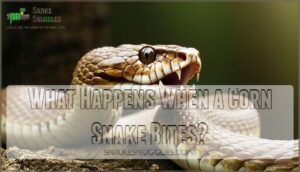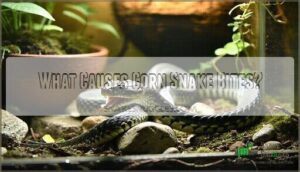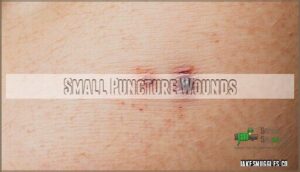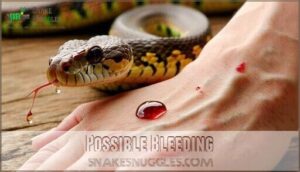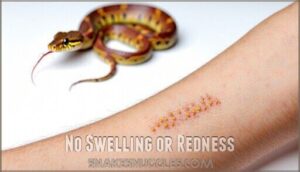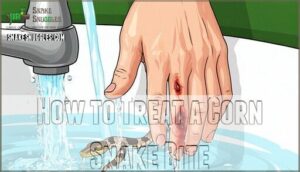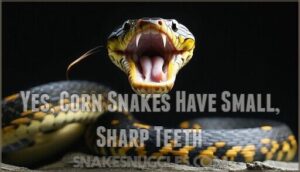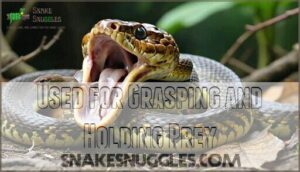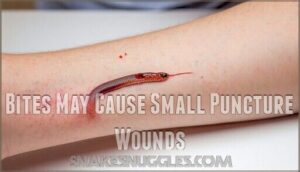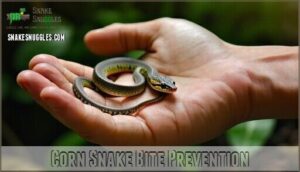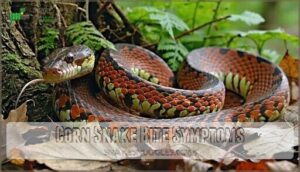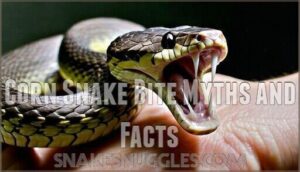This site is supported by our readers. We may earn a commission, at no cost to you, if you purchase through links.
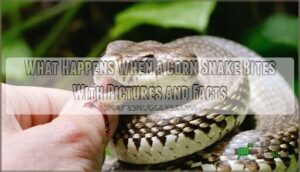
If a corn snake bites you, expect a quick pinch—think of tiny needles poking your skin.
You’ll see small puncture marks, maybe a drop or two of blood, but nothing dramatic.
Corn snakes aren’t venomous, so there’s no risk of poison or swelling.
Their teeth are sharp, used for grabbing prey, not harming you.
Usually, it’s a case of mistaken identity or stress, not aggression.
Treat the bite with soap and water, and you’re good to go.
Curious why these gentle snakes bite or how to avoid it?
There’s more ahead.
Table Of Contents
- Key Takeaways
- What Happens When a Corn Snake Bites With Pictures and Facts?
- What Happens When a Corn Snake Bites?
- Are Corn Snake Bites Dangerous?
- What Causes Corn Snake Bites?
- What Do Corn Snake Bites Look Like?
- How to Treat a Corn Snake Bite
- Do Corn Snakes Have Teeth?
- Corn Snake Bite Prevention
- Corn Snake Bite Symptoms
- Corn Snake Bite Myths and Facts
- Frequently Asked Questions (FAQs)
- Do you need a tetanus shot after a corn snake bite?
- How to know if a snake has bitten?
- Are corn snake bites harmful?
- Do corn snakes have teeth?
- What are corn snakes quick facts?
- What is the biggest trouble with corn snakes?
- Can corn snakes bite through thick gloves?
- Do corn snake bites leave scars?
- How long do corn snake bites take to heal?
- Can corn snake bites cause allergic reactions?
- Conclusion
Key Takeaways
- You’ll feel a quick pinch and see small puncture marks if a corn snake bites, but there’s no venom or serious pain.
- Their bites cause minor bleeding and heal fast with basic cleaning and antiseptic—no need for emergency care.
- Corn snakes bite mainly when stressed, hungry, or startled by sudden movements, so gentle handling helps prevent it.
- You don’t need to worry about lasting damage or scars; these bites are harmless and rarely leave a trace.
What Happens When a Corn Snake Bites With Pictures and Facts?
If you’re bitten by a corn snake, you’ll experience minimal pain comparable to a paper cut or pinch.
These non-venomous snakes create small puncture wounds with their tiny backward-angled teeth.
Snake bite marks appear as minor scratches with possible light bleeding.
Understanding corn snake behavior and snake tooth structure helps explain why corn snake bite incidents cause such minor discomfort, requiring only basic bite wound care.
What Happens When a Corn Snake Bites?
When a corn snake bites you, you’ll feel a quick pinch similar to a paper cut or needle prick.
The bite creates small puncture wounds from their tiny, sharp teeth, which may cause minimal bleeding that stops quickly on its own.
Mild Discomfort and Small Puncture Wounds
When a corn snake bites, you’ll feel mild discomfort similar to a small pinch. The small puncture wounds from their tiny teeth rarely cause serious concern.
Here’s what to expect:
- Pain Level: Light pinch sensation, less intense than a paper cut
- Wound Type: Minor puncture marks or scratches from backward-angled teeth
- Duration: Discomfort subsides quickly, healing within days
These nonvenomous snake bites require basic wound care – clean with soap and water, then apply antiseptic. Understanding normal snake behavior helps prevent future incidents.
Possible Bleeding From Tiny Teeth
When you get bitten, corn snake bites typically cause minimal bleeding from their tiny, needle-like teeth.
These puncture wounds are shallow and comparable to paper cuts.
The bleeding control needed is usually just gentle pressure with a clean cloth.
| Bite Aspect | Description | Care Level |
|---|---|---|
| Tooth Structure | 20-30 small, backward-angled teeth | Causes minor punctures |
| Bleeding Pattern | Light bleeding that stops quickly | Minimal intervention needed |
| Wound Appearance | Small puncture marks or scratches | Heals within days |
No Long-term Health Effects
Although minor bleeding might occur from corn snake bites, you won’t face lasting health problems.
These nonvenomous snakes create minor punctures that heal quickly with basic care. Here’s what you can expect:
- Minor injury symptoms disappear within days without medical intervention
- Snake bite treatment involves simple wound cleaning and monitoring
- Bite reactions remain minimal due to gentle handling practices during recovery
Health risks from corn snake bites are virtually nonexistent for most people, and the bites are from nonvenomous snakes, which means they create minor punctures that heal quickly, and overall, the situation is minor.
Are Corn Snake Bites Dangerous?
You might wonder if a corn snake bite poses any real danger to your health.
The good news is that corn snake bites are completely harmless to humans since these snakes are non-venomous and rely entirely on constriction rather than toxic substances to subdue their prey, which makes them non-venomous.
Non-venomous
You don’t need to worry about dangerous toxins when dealing with corn snake bites.
These nonvenomous snakes lack venom glands entirely, making their harmless bites comparable to minor scratches.
Unlike venomous species, corn snakes pose zero snake safety risks through envenomation.
Their bite marks represent minor injuries at most, reflecting normal snake behavior rather than any medical threat requiring emergency treatment.
Rely on Constriction to Capture Prey
Unlike venomous species, corn snakes use their muscles to subdue prey through powerful coiling techniques.
These constrictors wrap around their target and squeeze until circulation stops.
Understanding this predator behavior helps explain why their bites aren’t dangerous to humans.
Here’s how corn snake constriction methods work:
- Strike and Grip – Snake hunting begins with a quick bite to secure prey using backward-angled teeth
- Coiling Response – Body wraps around the victim in overlapping loops within seconds
- Pressure Application – Constricting techniques involve steady muscle contractions that restrict blood flow
- Monitoring Phase – Snake behavior includes sensing the prey’s heartbeat to determine effectiveness
- Swallowing Process – Corn snake facts show they consume prey headfirst after successful constriction
This explains why corn snake bite symptoms are minimal – their teeth serve only as anchors during prey capture, not weapons for defense.
Proper handling and care can reduce the risk of snake bite incidents.
No Risk of Envenomation
Corn snakes pose zero envenomation risk since they lack venom glands entirely.
These nonvenomous snakes can’t inject toxins through their bites. Understanding toxicity levels helps ease concerns about harmless bites.
| Aspect | Corn Snake Reality |
|---|---|
| Snake venom | Completely absent |
| Bite reactions | Mild puncture wounds only |
| Envenomation risk | Zero threat to humans |
What Causes Corn Snake Bites?
Corn snakes bite for several reasons, but most bites happen when they feel threatened or confused.
Understanding these triggers helps you handle your snake safely and avoid unwanted nips during care routines.
Sudden Movement
Moving from dangerous scenarios, let’s examine how sudden movements trigger defensive reactions in corn snakes.
When you make rapid movements near your snake, their quick reflexes activate a snake startle response.
This creates stress triggers that can lead to a snake bite.
Research shows sudden motion increases bite rates from 5% to 35%.
Proper corn snake care involves understanding snake behavior – always approach slowly and use gentle snake handling techniques to prevent defensive strikes.
Shedding Stress
Shedding stress makes corn snakes irritable and more likely to bite. During snake shedding, they become defensive and may strike when handled. You’ll notice specific stress signs that indicate when to avoid interaction.
Watch for these snake stress signals during shedding:
- Milky, clouded eyes that indicate pre-shed phase
- Dull, patchy skin that’s ready to peel off
- Reduced appetite and hiding behavior increases
- Heightened sensitivity to touch and movement
- Defensive posturing when approached or handled
Practice proper handling techniques by avoiding contact during this vulnerable time. Environmental factors like humidity levels affect shedding success. Humane care means respecting their natural process and giving space until fresh skin appears.
Stress From Other Sources
Beyond shedding, other environmental and handling factors create stress that triggers defensive biting. Poor habitat quality, temperature fluctuations, and social stress from excessive handling errors all contribute to snake anxiety. Health issues compound these problems, making snakes more reactive.
| Stress Source | Snake Response |
|---|---|
| Poor lighting/temperature | Defensive posturing, hiding |
| Loud noises/vibrations | Striking behavior, coiling |
| Overcrowding/disturbance | Increased aggression, biting |
| Handling stress during illness | Snake bite reaction, withdrawal |
| Unfamiliar scents/objects | Alert posture, defensive strikes |
Recognizing snake stress signals like defensive coiling or rapid tongue-flicking helps prevent bites. Stress reduction involves maintaining consistent environmental conditions and minimizing disturbances.
Hunger
A hungry corn snake might confuse your fingers for dinner.
When corn snakes haven’t eaten for weeks, their predatory instincts kick in during handling.
Your warm hand can trigger their feeding response, leading to snake bite hunger incidents.
These food mistakes happen because hungry snakes rely on heat and movement to identify prey.
Understanding snake nutrition helps prevent these situations.
- Maintain a consistent feeding schedule every 7-10 days for adults
- Watch for hunger signs like increased activity and tongue flicking
- Avoid handling 2-3 days before scheduled feedings
- Never handle immediately after placing food in the enclosure
Snake feeding affects their behavior substantially.
A well-fed corn snake rarely bites defensively.
However, snake bite risks increase when you disrupt their natural hunting patterns.
Snake bite pain from hunger-motivated strikes feels identical to defensive bites – like a quick pinprick.
Proper bite prevention starts with understanding your snake’s dietary needs and respecting their feeding cycle.
Poor Handling Technique
Poor handling techniques cause most corn snake bites.
Approaching from above triggers defensive strikes since snakes see overhead movement as predator threats.
Gentle touch and calm approach prevent stress-induced bites.
Support their body fully, avoid grabbing the tail, and move slowly.
Safe grip means using both hands while keeping the snake close to surfaces.
Proper snake handling reduces snake bite risks substantially.
Understanding proper handling techniques is vital for a safe and enjoyable experience with corn snakes.
Overhandling
Overhandling your corn snake isn’t just annoying for them—it can lead to snake stress and even a snake bite.
Stick to gentle touch and solid handling techniques. If your corn snake starts hiding, skipping meals, or acting jumpy, it’s asking for space.
Snake comfort matters, so watch for these signs:
- Hiding constantly
- Refusing food
- Acting defensive
Unfamiliar Environment
Moving your corn snake to a new enclosure can trigger Environmental Stress and Spatial Anxiety, making it more prone to bite.
Snake behavior often shifts in unfamiliar environments, so give your pet time to settle.
Add hiding spots and clutter to help it feel safe, with patience and gentle handling, you’ll reduce snake bite risks and encourage healthy corn snake behavior.
Snake safety starts with understanding Habitat Changes and snake bite prevention.
Health Issues
Health matters regarding preventing bite injuries and infection risk. A stressed or sick corn snake is more likely to bite, so keep a close eye on its health.
If you spot snake bite symptoms or odd behavior, act fast.
Here’s what you should do:
- Monitor for illness or discomfort.
- Provide enrichment.
- Seek medical response.
What Do Corn Snake Bites Look Like?
When a corn snake bites, you’ll usually see a few small puncture marks or scratches, sometimes with a little blood.
There’s rarely any swelling or redness, and the wounds heal quickly with basic care.
Small Puncture Wounds
A corn snake bite leaves small puncture marks from its tiny snake teeth, looking a bit like a pinprick.
You’ll notice minor bleeding, but pain is light—think a scratch, not a gash.
Good wound care matters: clean the snake bite wound with soap and water, use antiseptic, and watch for bite symptoms of snake bite infection or minor injury.
Possible Bleeding
You might notice a bit of blood after a snake bite wound, but the bleeding risk is low.
These minor cuts usually stop bleeding fast.
- Small puncture marks and minimal blood loss
- Quick clotting with proper wound care
- Rare snake bite complications or infection
Clean the area and watch for any snake bite infection, ensuring proper wound care.
No Swelling or Redness
After a corn snake bite, you’ll usually see minor injury marks—tiny punctures with little to no swelling or redness. The skin reaction is mild, and most people don’t notice much more than a faint scratch.
For snake bite first aid and quick healing, just follow these simple steps:
- Wash the bite area with soap and water for proper wound care.
- Dab on antiseptic to keep things clean.
- Cover with a bandage if there’s any bleeding.
- Watch for bite marks changing—mild symptoms only, but monitor for snake bite complications.
No swelling or redness means low snake bite severity. For overall health and safety, it’s essential to monitor the bite area closely, and if you notice any unusual symptoms, seek medical attention immediately for proper wound care.
How to Treat a Corn Snake Bite
If a corn snake bites you, it’s important to stay calm and handle the situation carefully to avoid stressing the snake further.
You’ll need to clean the wound, watch for signs of infection, and apply a bandage if needed.
Remain Calm and Still
After spotting those tiny puncture marks, your next step is calm handling. If you remain calm and still, you’ll notice the snake’s behavior shifts—they sense your gentle touch and are less likely to constrict or bite again.
Sudden moves can ramp up stress and snake bite severity, but staying put helps with stress reduction for both you and your pet. Safe interaction starts with steady hands and a cool head.
This simple snake bite first aid tip means less damage, quicker healing, and smoother snake bite treatment every time. Having the right first aid supplies is essential in case of a snake bite emergency, ensuring quicker healing and smoother treatment.
Gently Unwind The Snake if Constricted
After staying calm, focus on gentle handling. If your corn snake wraps around your hand, don’t yank or panic.
Use slow unwinding techniques—start at the tail, not the head. Constrictors like corn snakes grip for safety, so treat them kindly.
Snake constriction isn’t dangerous, but gentle handling helps avoid stress. Prioritize snake safety and proper corn snake care during unwinding.
Give The Snake Space
Anyone who’s ever tried Snake Handling knows personal space matters—even for snakes. After a bite, give the snake space to relax. This helps with stress reduction and gentle care.
Understanding snake bite basics is essential for proper handling.
Watch for these five steps:
- Move your hands away.
- Let the snake calm down.
- Avoid sudden moves.
- Observe Snake Behavior.
- Practice gentle handling for future encounters.
Apply a Bandage if Necessary
Once you’ve given the snake some space, check the bite.
If it’s bleeding, grab a clean bandage and wrap it gently—don’t go overboard with tightness.
Skip tourniquets and ice.
Good snake bite wound care means watching for redness, swelling, or pus.
If things look off, don’t wait—seek medical help for proper snake bite infection prevention and wound healing.
Do Corn Snakes Have Teeth?
You might be surprised to learn that corn snakes do have teeth, but they’re small and sharp, designed for gripping prey.
These tiny teeth can cause minor puncture wounds if a snake bites, but they’re not meant for tearing skin.
Yes, Corn Snakes Have Small, Sharp Teeth
You’ll notice Corn Snakes don’t have snake fangs, but they do have small teeth—about 20-30—arranged in neat rows.
Their sharp teeth are perfect for their tooth structure, letting them grip prey.
Snake dentition is fascinating because these fangless snakes replace their teeth throughout life.
So, if you’re worried about a snake bite, rest easy; their small, sharp teeth won’t do much damage, and it’s interesting to note the concept of fangless snakes and their unique tooth structure.
Used for Grasping and Holding Prey
Think of a Corn Snake’s mouth as a toolkit for hunting.
Its Tooth Structure features backward-curved teeth, forming a reliable Grasping Mechanism for holding prey tight.
These teeth, key to Snake Dentition, help with Prey Capture and make constricting more effective.
The snake’s Hunting Tactics rely on this grip, ensuring prey doesn’t slip away during feeding, and its ability to grasp is crucial for successful Prey Capture.
Bites May Cause Small Puncture Wounds
When corn snakes bite, their snake teeth create small puncture marks on your skin.
These minor injuries typically produce minimal bleeding and heal quickly with proper wound care.
The bite symptoms resemble a pinprick or light scratch.
Snake bite effects from corn snakes remain mild since they’re non-venomous.
Clean any snake bite wound immediately and monitor for infection signs during snake bites treatment.
Corn Snake Bite Prevention
You can prevent most corn snake bites by following simple handling guidelines that respect your snake’s natural behaviors.
Focus on proper feeding schedules, gentle handling techniques, and recognizing stress signals to create a safe environment for both you and your pet.
Avoid Sudden Movements Around Snakes
Approaching your corn snake slowly prevents triggering defensive reactions that lead to snake bite incidents. Sudden movements activate stress responses, making bites 70% more likely during handling.
Follow these Snake Handling Tips for Safe Interaction:
- Gentle Approach from below rather than looming overhead
- Move deliberately to maintain a Calm Environment
- Avoid quick gestures near the snake’s head for Stress Reduction
Using proper snake handling tools is essential for safe interaction. Respectful handling keeps both you and your corn snakes comfortable while preventing unnecessary snake bite danger.
Handle Snakes Gently and Minimize Stress
Gentle handling transforms nervous snakes into calm companions.
Safe interaction requires slow movements and stress reduction techniques that respect snake behavior.
Support your corn snake’s body completely when lifting, avoiding sudden grabbing motions.
Create calm environments through consistent proper handling methods.
This approach prevents defensive reactions and snake bites, making each interaction pleasant for both you and your pet.
Ensure Snakes Are Well-fed and in a Familiar Environment
Keeping your corn snake well-fed and comfortable prevents stress-related bites.
A hungry snake might mistake your hand for food, while an uncomfortable snake becomes defensive.
Snake Feeding Tips and Environment Setup:
- Follow regular feeding schedules every 7-10 days to prevent hunger-induced mistakes
- Create a proper enclosure with hiding spots, correct temperatures, and humidity levels
- Maintain a familiar environment by avoiding frequent cage changes or disruptions
- Practice snake stress reduction through consistent care routines and minimal disturbances
Understanding proper snake food options is essential for a healthy pet, and learning about snake food can help.
Seek Veterinary Care if a Bite Occurs
Most corn snake bites don’t require emergency response, but proper snake bite first aid matters.
Clean the wound immediately and monitor for infection signs.
Here’s when to seek veterinary care:
- Wound shows redness or swelling – infection needs medical attention
- Bleeding won’t stop – proper wound cleaning may require professional help
- You’re unsure about tetanus status – veterinary advice guarantees complete snake bite treatment
Professional snake bite medical advice helps with wound healing and infection prevention.
Corn Snake Bite Symptoms
If you get tagged by a corn snake, you’ll experience minimal discomfort similar to a paper cut.
These non-venomous reptiles cause only minor puncture wounds that heal quickly with proper wound care.
Here are the typical corn snake bite symptoms:
- Pain Levels – Light pinching sensation, less intense than a paper cut or needle prick
- Bite Reactions – Small puncture marks from backward-angled teeth, minimal tissue damage
- Snake Bite Healing – Quick recovery within days, no long-term effects expected
- Infection Risk – Low chance of complications with proper cleaning and antiseptic treatment
- Snake Behavior – Brief defensive response, snake typically releases immediately after contact
Most corn snakes prefer retreating over biting.
Treating snake bites involves cleaning wounds with soap and water, then applying antiseptic.
Snake bite infection remains uncommon but watch for redness or swelling.
Corn Snake Bite Myths and Facts
You might hear some wild stories about corn snake bites, but most aren’t true.
Let’s clear up the facts, so you’ll know exactly what to expect if one ever nips you.
Corn Snakes Are Non-venomous
Corn snakes are nonvenomous, so you don’t have to worry about toxins or serious bite reactions.
Their small teeth are built for grasping prey, not for injecting venom. Any snake bite from a corn snake is harmless—think of it as a scratch, not a threat.
This gentle Snake Behavior and Snake Anatomy make corn snakes safe for most snake care situations. Corn snakes exhibit typical snake venom characteristics that are actually a lack of venom glands.
Bites Do Not Contain Toxins
You don’t need to worry about Snake Venom with corn snakes—their bites are Toxin Free Bites.
Here’s what you should know about Non Toxic Effects and Bite Reactions:
- Harmless wounds from corn snake bites heal quickly.
- You won’t find any toxins or venom in their bite.
- Nonvenomous constriction is their hunting style.
- Snake bite facts: bites are more like pinpricks, not emergencies.
Bites May Cause Mild Discomfort and Small Puncture Wounds
Even though corn snake bites might sound scary, you’ll usually just feel mild discomfort—think of a tiny pinch or scratch.
Bite symptoms include small puncture wounds and a bit of tenderness, but nothing serious.
Since corn snakes rely on nonvenomous constriction, their bites cause only minor injuries.
Wound care is simple: clean the area, watch for infection, and practice good bite prevention by handling your snake gently and calmly, which is crucial for minor injuries.
Frequently Asked Questions (FAQs)
Do you need a tetanus shot after a corn snake bite?
Let’s test the theory—do you really need a tetanus shot after a corn snake bite?
Unless your tetanus vaccine isn’t up to date or the wound looks dirty, you’re usually safe.
Just clean and monitor.
How to know if a snake has bitten?
You’ll spot tiny puncture marks, maybe a little blood, and feel a sharp pinch or scratch—like a cat’s swipe or a needle prick.
The area might get tender, but it heals quickly with simple care.
Are corn snake bites harmful?
Think of a corn snake bite like a tiny needle prick—it’s not harmful.
You might feel a light pinch, see a scratch or a drop of blood, but there’s no venom, lasting pain, or medical emergency, which can be summarized as no venom.
Do corn snakes have teeth?
Yes, corn snakes have teeth—about 20 to 30 small, sharp, backward-angled ones.
They’re not fangs, just tiny grips for holding prey.
You’ll barely notice them unless you look close or get a gentle pinch.
What are corn snakes quick facts?
Corn snakes are escape artists, growing 5-5 feet long, living up to 20 years, and sporting 20-30 tiny, backward-angled teeth.
They’re non-venomous, gentle, and rarely bite unless stressed, hungry, or defending themselves.
What is the biggest trouble with corn snakes?
The biggest trouble you’ll face is accidental bites from stress, hunger, or poor handling.
These bites are minor—like a cat scratch—but can get infected if ignored.
Handle gently, keep their environment stable, and you’ll avoid problems.
Can corn snakes bite through thick gloves?
You’re safe with thick gloves—corn snake teeth are tiny and needle-like, so they can’t pierce sturdy material.
Gloves act like armor, blocking bites and scratches, making handling less stressful for both you and your snake.
Do corn snake bites leave scars?
You probably won’t end up with a scar after a corn snake bite.
Their tiny teeth just leave small scratches or punctures, like a paper cut.
With good cleaning and care, your skin usually heals without a trace.
How long do corn snake bites take to heal?
Picture a tiny scratch healing over a few days—most corn snake bites close up in 2–5 days.
You’ll just need to clean the wound, keep it dry, and watch for any signs of infection.
Can corn snake bites cause allergic reactions?
You usually won’t get an allergic reaction from a corn snake bite, since they’re non-venomous.
If you notice swelling, redness, or itching, treat it like any minor scratch, and watch for infection signs.
Conclusion
Imagine you’re cleaning your corn snake’s tank and it mistakes your hand for food—suddenly, you feel a quick pinch.
That’s what happens when a corn snake bites with pictures and facts: you’ll notice tiny puncture marks, maybe a drop of blood, but no swelling or serious pain.
These gentle snakes aren’t venomous, so there’s no risk of toxins.
Just wash the bite, keep calm, and handle your snake carefully to prevent future bites.

